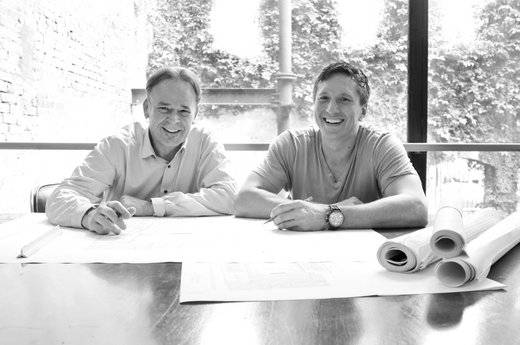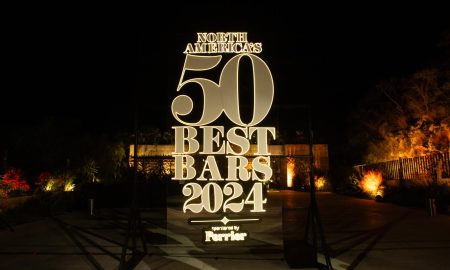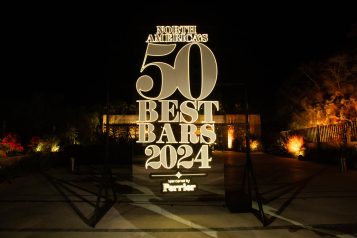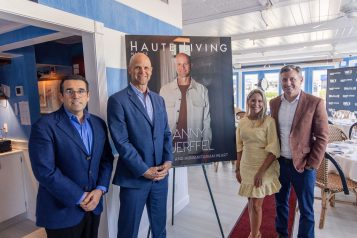Royce Ring and Alex Urrunaga of Plan B Group
Weigh-in on Changing Landscape of the Dallas Restaurant World
You could consider Plan B Group hospitality architects, if you are looking for a simple definition. Only, Principals Royce Ring and Alex Urrunaga don’t just concoct designs for restaurant spaces—they are in charge of the entire gamut of their client’s image and business, from the exterior design to the uniforms of the employees and the carefully selected menu. They are, in essence, brand makeover specialists, which gives them an incredible viewpoint on what is evolving in the Dallas restaurant world and beyond.
Most of the clients Plan B serves are restaurateurs, looking to formulate new eateries or refine existing ones. Oak Cliff’s popular new restaurant Bolsa, co-owned by Ring and Urrunaga, was one of their creations. They have also worked with Italian heavyweight Olive Garden. The difference? “Chef-driven restaurants are already small, nimble, and focused on the one thing in front of them,” says Ring. “A national brand is focused on two things: one, something that is scalable, replicable, can be reproduced and that will broadcast; two, the Olive Garden type execs eat out at Bolsa. They have the exposure to the market, so they know what is possible and relevant with today’s consumers. They call us in to shift the thinking, shape up the thinking, and jar the comfort zones of their brand or organization.”
Ring and Urrunaga both agree that the downturn in the economy has changed the face of the restaurant industry. Where were once chain, big-name restaurants are independent, neighborhood eateries; white linens exchanged for al fresco picnic tables, mahogany panels traded for plywood and recycled metal.
“People have changed the way they do things, what they spend their money on,” explains Ring. “Maybe they are trading from Kobe steaks to Kobe burgers, a $150 bottle of wine to a wine by the glass. Most people want to go to a local joint, not to national chains. We’ve seen many national chains trying to catch up to trends that began at independent, neighborhood restaurants. It’s done by rebranding and creating new concepts.”
“People will never return to the behaviors that started in the mid 90s to 2008,” says Urrunaga. “All the accumulating, the opulence, today it’s not sensible or fashionable. Big SUVS went to Hybrids, people are more conscious of environment or community. I think that’s a reflection of what’s happened economically. I think if the stock market hits 15,000 next year people are not going to say let’s break out the Silver Oak and go get a steak.”
Looking at the trends, it’s hard not to see the guys are right. The Houston’s chain has changed their individual location names to give them a more “neighborhood” feel (example, Hillstone Park Cities). Plan B is currently working with Deep Ellum burger joint Twisted Root, a restaurant in Highland Park Village and One Arts Plaza to reenergize and refine the plaza. Urrunaga explains, “In order to compete you have to be relevant, in order to be relevant you have to be ever-changing and stay ahead of the game but stay true to the brand.”
“People still appreciate good things,” Ring explains. “We have seen the change in the restaurant world. It’s all about the food, simplified. They care less about location. Patrons are so much more educated, they know more about food, something they have experienced in another country, in another restaurant.”
“You can feed them but you can’t fool them,” adds Urrunaga. “Everyone from Chipotle to independent locavore restaurants are focused on ingredients that are from local, quality places. It all plays into what the consumer demands and appreciates. When this ‘slow food’ movement becomes mainstream it will evolve into something else, and we don’t know what that will be yet.”
Although Dallas is their home base, Ring and Urrunaga work on a national and international scale. They are currently working with a large restaurant chain in Russia, which could eventually lead to a changing restaurant environment over there that may be somewhat similar to what we are experiencing.
“Dallas is viewed as a city full of entrepreneurs,” says Urrunaga. “The city has roots in oil and cattle, and maybe that’s where the money comes from. But the market is very open to new ideas; that’s why entrepreneurs love it here. We see fewer restaurateurs scraping buildings and doing ground-up development. People aren’t so trigger-happy. Now they are more conscious, they can make this building work, put some work into it. I think that shift in thinking is giving Dallas a little more soul, if you will, to enable the gentrification to emerge organically.”





















